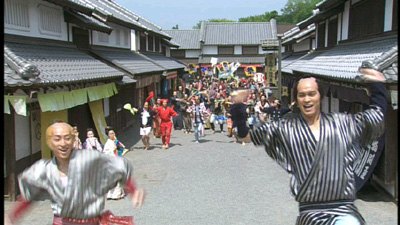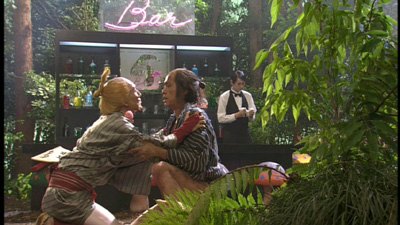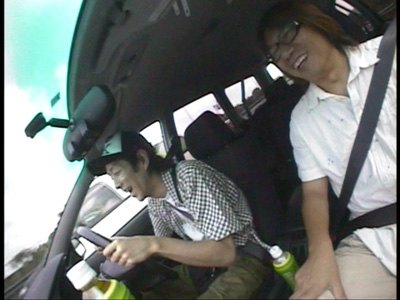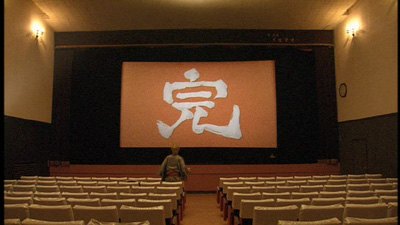| Reviews & Columns |
|
Reviews DVD TV on DVD Blu-ray 4K UHD International DVDs In Theaters Reviews by Studio Video Games Features Collector Series DVDs Easter Egg Database Interviews DVD Talk Radio Feature Articles Columns Anime Talk DVD Savant Horror DVDs The M.O.D. Squad Art House HD Talk Silent DVD
|
DVD Talk Forum |
|
|
| Resources |
|
DVD Price Search Customer Service #'s RCE Info Links |
|
Columns
|
|
|
Yaji and Kita - The Midnight Pilgrims
THE MOVIE:

Kankuro Kudo wrote Takashi Miike's 2004 superhero B-movie Zebraman, so he's no stranger to Miike's anything-goes filmmaking style. As Miike fans well know, however, the full-throttle approach means that a Miike film has just as much chance to be utter crap as it does to be genius. In his directorial debut, Yaji and Kita - The Midnight Pilgrims, Kankuro Kudo has missed genius by many miles.
Based on a comic book by Kotobuki Shiriagari (which has been made into a film before), Kudo's Yaji and Kita is a psychedelic, gay-romance road movie, where the road takes us across Japan and through time, as well. Yaji (Tomoyo Nagase, the "Ring: the Final Chapter" TV series) has received a postcard telling him a health spa in faraway Ise has the key to happiness. Hoping to get his deranged lover Kita (Schichinosuke Nakamura, The Last Samurai) off of drugs, he convinces the blonde junkie to go with him. After a rockin' song-and-dance number, they hop on a chopper decorated in the stars-and-stripes and hit the highway. Of course, given that they are living in the Edo period, a segment of Japanese history that ended in the 1800s, these are rather outlandish anachronisms, but it's the norm for this rather self-conscious bid for midnight-movie cult status.
Had Yaji and Kita maintained the pace and exuberance of that opening musical number, then Kudo might have had a camp successor to The Apple or Rocky Horror. Instead, he kicks his heroes off of their motorcycles and makes them walk to Ise (as the police officer who pulls them over tells them, Edo men have been walking for hundreds of years), effectively killing the energy of his film. The long trek from ancient Japan to the modern skyline of Ise is tedious because, for as weird as Kudo wants to make it, the film just isn't funny. The pair goes from one pit stop to another, declaring their gayness in a manner that is just a hair shy of being offensive and running afoul of trouble. First they end up at the Laugh Inn, where would-be comedians have to tell jokes to get past the town magistrate, and then there is the Pleasure Inn, where schoolgirls do cheers in honor of a befuddled mafia boss. None of it makes a lick of sense, and there isn't enough that is really entertaining to distract us from that. Keep me laughing and I won't even question how all the school girls died, something that was never answered in the film even as its other murder mystery is solved.
That's right, Yaji and Kita also has a murder plot. Yaji's wife (Eiko Koike, Kamikaze Girls) is found dead back in Edo, and now the cops are on their tails. This is more of a sidebar story, really, as Kudo tends to forget about Yaji and Kita's pursuers for long stretches of the film.
Things improve when the boys hit the Singing Inn, run by a drag queen with a penchant for performing. There are a couple more musical numbers, and they are fun, confirming what I had thought at the beginning: Yaji and Kita - The Midnight Pilgrims should have been a musical throughout. Sadly, their stay at this inn is not to last. We have a trip to a magic mushroom bar, a journey through the land of the dead, and Yaji being farted on by the River Styx to get through before this mess will end.
Visually, Yaji and Kita is of a quality lacking in the muddled script. Kudo makes everything bright and flashy, and there are several scenes where his inventiveness as a director is quite remarkable. The opening dream sequence where Yaji plays Tetris on a river with a long line of corpses and an optical illusion with Mt. Fuji both have the right kind of whacky flavor, as do most of the dreams and hallucinations throughout the film. The visual payoff of the elephant that a street hawker is shouting about at the beginning of the film is nearly worth making it to the climax for. (Isn't that a Chekhov rule? If you have an elephant in the first act, it has to go off in the third.) It's almost ironic that Kudo would have gotten the look of the film right and so badly blown the writing, as his career was built on his strengths as a writer (he also wrote 2002's Ping Pong, among others). Usually, you would think a first-time director would look like he was trying too hard to establish a style rather than have a screenplay that comes off as such, but maybe that's what happened. Kankuro Kudo was too busy worrying about how Yaji and Kita - The Midnight Pilgrims looked and not nearly as concerned with how it played.

THE DVD
Video:
Tokyo Shock's DVD of Yaji and Kita - The Midnight Pilgrims is given a 1.85:1 anamorphic widescreen transfer. They did an amazing job. The colors in the film are brilliant, and the image is flawless throughout.
Sound:
There is both a 5.1 and a 2.0 mix of the original Japanese language track. The mix is really nice, with some cool foreground and background tricks in the complex crowd scenes. The English subtitles are easy to read, with very few typos. Some of the phrasing is odd, but it usually came across as intentional humor.

Kankuro Kudo and Kotobuki Shiriagari
Extras:
Disc one has four trailers for other Tokyo Shock films.
Disc 2 is exclusively bonus features. The two main ones are a long road trip documentary and the "making of." The road trip is taken by director Kankuro Kudo and the author of the original Yaji and Kita story, Kotobuki Shiriagari. They travel overnight to Tokaido and stop at various tourist-type places, including learning to make fish cakes, visiting Kudo's sister at the natural history museum where she works, and looking at meteor fragments at Shimoda Castle. It has some fun moments, largely stemming from what dorks the two guys are. There is a scene where they sneak in next to a family having their photo taken, and with the two of them, it looks like some kind of Revenge of the Nerds outtake.
The behind-the-scenes film is rather extensive, but also extremely fast paced. It marks the day-by-day shooting of the film, with the dates appearing on screen as we move from one spot on the schedule to the next. It begins with the prayer for safety and purification rituals, and ends with the wrap and the premiere two years later (the film itself was shot in sequence). I liked seeing the footage of the art director working on Kita's house, and I wish there was more attention paid to the sets. I also would have liked to see more of the waiting room near the River Styx, where one actor played every soul in the place. It looked like an involved process, having to film him in every chair doing different things and then composite them together. After the day-by-day shooting, there are three more individual segments: a lengthy look at the music recording with a live performance by one of the participating bands, Group Tamashi; a shorter featurette on the digital special effects work; and an even shorter one on the costuming process.
Fifteen minutes of deleted scenes come next. If you found the film as much of a chore to watch as I did, then expect more tedium. It's made worse by the fact that these aren't really complete scenes, but trims off of other scenes. Also, remember how I said I wished there was more footage of the guy playing all the souls down in Hell? Well, I should've been careful what I wished for, because at least ten minutes of this are one-sided shots from purgatory.
Next on the menu is a trailer and TV spots. There are four in all, though not subtitled.
The last feature is a short film by Kudo called "Real Defense Services." Lasting about 13 minutes, it's a low-budget slapstick affair about the public safety team left behind to take care of things after Yaji and Kita go to Ise. Hallucinations are manifesting all over the city, and the Defense Service fights them off. It's essentially a Power Rangers parody, and it has cameos by Kankuro Kudo as a pizza delivery boy and Schichinosuke Nakamura shows up as Kita. The box claims that there is a short film by Shiriagari, and I assume this is the one they meant. The credits aren't translated, so I'm not sure if he wrote it or if the listing on the box is a mistake. (I'd have actually liked to have gotten some background on the source material for the movie. I'm curious how close this is to the comic book.)
The DVD comes housed in a cardboard slipcase.
FINAL THOUGHTS:
Skip It. Yaji and Kita - The Midnight Pilgrims is a pretentious mess by first-time director Kankuro Kudo. Though visually dynamic, the film strains for weirdness, and rather than hitting the mark, it comes off as artificial. The farther on the road to Ise these pilgrims get, the more weary you will become.

Jamie S. Rich is a novelist and comic book writer. He is best known for his collaborations with Joelle Jones, including the hardboiled crime comic book You Have Killed Me, the challenging romance 12 Reasons Why I Love Her, and the 2007 prose novel Have You Seen the Horizon Lately?, for which Jones did the cover. All three were published by Oni Press. His most recent projects include the futuristic romance A Boy and a Girl with Natalie Nourigat; Archer Coe and the Thousand Natural Shocks, a loopy crime tale drawn by Dan Christensen; and the horror miniseries Madame Frankenstein, a collaboration with Megan Levens. Follow Rich's blog at Confessions123.com.
|
| Popular Reviews |
| Sponsored Links |
|
|
| Sponsored Links |
|
|
| Release List | Reviews | Shop | Newsletter | Forum | DVD Giveaways | Blu-Ray | Advertise |
|
Copyright 2024 DVDTalk.com All Rights Reserved. Legal Info, Privacy Policy, Terms of Use,
Manage Preferences,
Your Privacy Choices | |||||||















